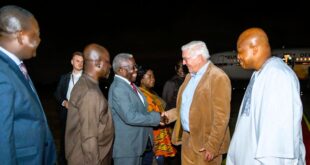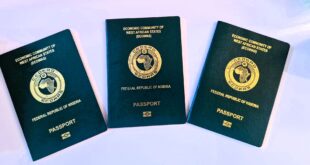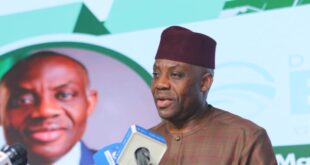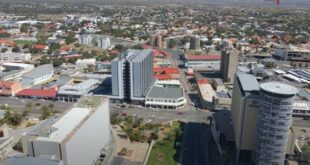After a military standoff and a flurry of diplomatic activities following last month’s presidential election, former President Yahya Jammeh finally left The Gambia late Saturday for a new life in exile.
To avoid military confrontation with Senegalese-led ECOWAS troops, he had agreed on Friday to step down and leave the country after two days of marathon negotiations with Presidents Alpha Condé of Guinea and Mohamed Ould Abdel Aziz of Mauritania.
Jammeh, who ruled his country for 22 years, departed in an executive jet from Banjul, seen off by a small crowd of his relatives and supporters and bringing an end to a protracted political crisis.
The plane which also carried President Condé arrived Conakry, Guinea’s capital, about 90 minutes later and Jammeh and his family were said to have left in another plane immediately for a new life in Equatorial Guinea.
With the new development, the new president, Adama Barrow, who was sworn in last Thursday in Dakar can immediately return to his country and assume office.

Jammeh is said to have chosen Equatorial Guinea as his new home because the country is not a signatory to the Rome Statute establishing the International Criminal Court (ICC) which precludes the likelihood of his being delivered to the court.
Jammeh’s government withdrew The Gambia from the ICC last year, accusing it of targeting African leaders and derisively describing it as the “International Caucasian Court”.
In fact, the ex-Gambian leader is said to have reversed his earlier concession of defeat after the 1 December election when calls were made by members of the opposition coalition, which sponsored Barrow’s candidacy, that Jammeh could be called to account for rights abuse during his rule.
“No legislative measures” would be taken that would infringe the “dignity, security, safety and rights” of Jammeh or his family, ECOWAS has said in a joint declaration with the African Union and United Nations.
Jammeh could return to The Gambia when he pleased, the statement added, and property “lawfully” belonging to him would not be seized.
No further details have been published on the deal that finally convinced the long-term Gambian leader to step down and head for exile.
It’s however clear from the ECOWAS statement that Jammeh and his top aides and family members will not be prosecuted for any crimes they may have committed in office and their property will not seized.

ECOWAS had vowed to remove Jammeh by force if he did not step down. The regional group assembled a multinational military force, including tanks, which moved into The Gambia last Thursday.
With Jammeh’s departure, a new era has begun in The Gambia after more than two decades of what critics describe as Jammeh’s iron-fisted rule which saw many opponents of the government driven into exile, jailed, tortured and killed.
Human rights activists have repeatedly demanded that Jammeh be held accountable for alleged abuses. Barrow has promised that he would not witch-hunt the Jammeh regime but would set up a truth and reconciliation commission.
The new president has also called on the more than 46,000 Gambians who have fled to Senegal in the past one week amid political tension to return to their home country.
Scenes of jubilation broke out almost immediately on the streets of Banjul after it became known that Jammeh had gone.
Analysts will be busy in the next months drawing a balance sheet of Jammeh’s legacy which also includes a marked improvement in areas such as infrastructure, health services and education.
Ken Kamara
Editor’s Note: The African Courier thanks several colleagues in The Gambia who have been giving us direct on-the-spot information about the crisis in the country. We’re most grateful to you all.
 THE AFRICAN COURIER. Reporting Africa and its Diaspora! The African Courier is an international magazine published in Germany to report on Africa and the Diaspora African experience. The first issue of the bimonthly magazine appeared on the newsstands on 15 February 1998. The African Courier is a communication forum for European-African political, economic and cultural exchanges, and a voice for Africa in Europe.
THE AFRICAN COURIER. Reporting Africa and its Diaspora! The African Courier is an international magazine published in Germany to report on Africa and the Diaspora African experience. The first issue of the bimonthly magazine appeared on the newsstands on 15 February 1998. The African Courier is a communication forum for European-African political, economic and cultural exchanges, and a voice for Africa in Europe.

































